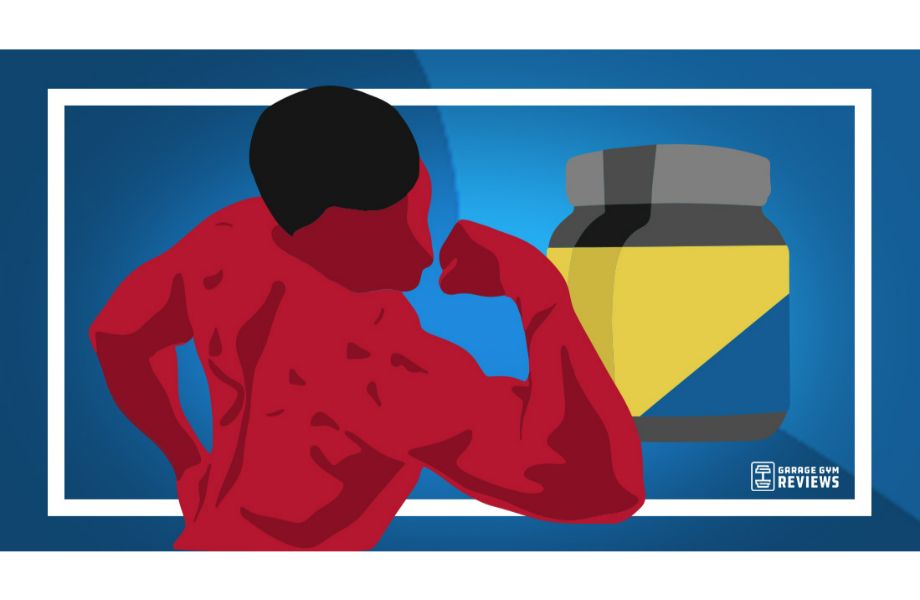We test and review fitness products based on an independent, multi-point methodology. If you use our links to purchase something, we may earn a commission. Read our disclosures.
Even if you have little idea about how to build muscle, you still might imagine bodybuilders choking down raw eggs, force-feeding themselves endless plates of chicken and broccoli, and chugging down a protein shake. We’ll go with the latter option.
If anything goes better together for muscle growth (sorry chicken and broccoli, you’re not it), it’s a structured resistance training plan and adequate protein. Some protein powders even pair infamous flavor combo duos—looking at you, Chocolate Peanut Butter!
But whether you’re looking to start your protein powder journey, questioning if yours is the right one for you, or simply wanting a change of protein pace, look no further. We’ve covered you and your muscle-gaining goals with this best protein powder for muscle gain round-up!
We’re a team of certified personal trainers, competitive weightlifters, and registered dietitians who have researched well over 100 protein powders and tried 75 of them to give you our top picks. We narrowed down our choices by looking at:
- Ingredients and formulation: Does it have muscle-building ingredients in clinically-recommended doses?
- Protein content: Does it have at least 20 grams of protein per serving?
- Taste: Does it taste good?
- Price: How expensive is it?
Medical disclaimer: This article is intended for educational and informational purposes only. It is not intended as a substitute for medical advice. For health advice, contact a licensed healthcare provider.
13 Best Protein Powders for Muscle Gain
- Best Protein Powder for Muscle Gain Overall: Transparent Labs 100% Grass-Fed Whey Protein Isolate
- Best Protein Powder for Muscle Gain Post-Workout: Jacked Factory Authentic ISO
- Best Natural Protein Powder for Muscle Gain: Legion Whey+
- Best-Tasting Protein Powder for Muscle Gain: XWERKS Grow
- Best Vegan Protein Powder for Muscle Gain: Ritual Essential Protein 18+
- Best Budget Protein Powder for Muscle Gain: Nutricost Whey Protein Concentrate
- Best Grass-Fed Protein Powder for Muscle Gain: Momentous Grass-Fed Whey
- Best Personalized Protein Powder for Muscle Gain: Gainful
- Best Protein Powder for Weight Gain: Sports Research Whey Protein
- Best Casein Protein Powder for Muscle Gain: Transparent Labs Casein
- Best Whey Protein Powder for Muscle Gain: 1st Phorm Phormula 1
- Best Plant-Based Protein Powder for Muscle Gain: VEGA Sport Plant Protein
- Best Organic Protein Powder for Muscle Gain: Organifi Complete Protein
Best Protein Powder for Muscle Gain Overall: Transparent Labs 100% Grass-Fed Whey Protein Isolate
Good for: Those looking for a high-quality, whey-based protein to enhance their muscle growth and recovery
Best Overall
Transparent Labs 100% Grass-Fed Whey Protein Isolate
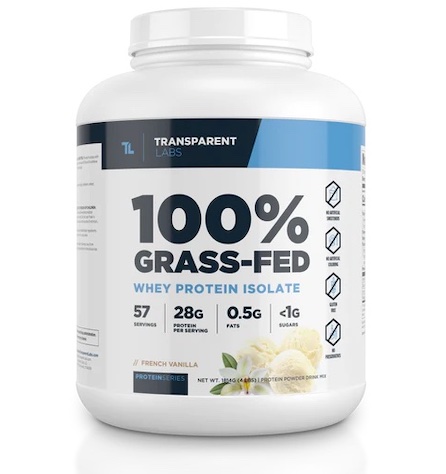
Product Highlights
- High-quality whey protein isolate
- 28 grams of protein per serving
- 15 flavors to choose from
- $1.99 per serving
Pros & Cons
Pros
- High-quality protein
- No artificial sweeteners, food dyes, or preservatives
- Lots of flavors to choose from
- Good customer reviews
- Whey isolate may be easier to digest for some people
Cons
- Price per serving on the high end
Bottom Line
Our testers love Transparent Labs 100% Grass-Fed Whey Protein Isolate because we know exactly what's in it, and almost every flavor we've tried is a 5 out of 5 on taste. Yes, it's a little more expensive than other protein powders but you get what you pay for.
This isn’t the first, second, or even third time that Transparent Labs 100% Grass-Fed Whey Protein Isolate has landed on a list of our top picks. In fact, it even made our best protein powder list, primarily thanks to Transparent Labs’ commitment to transparency and quality.
Transparent Labs 100% Grass-Fed Whey Protein Isolate contains only a few high-quality ingredients, like its main feature: grass-fed whey protein isolate that provides 28 grams of pure protein with each single-scoop serving.
The grass-fed American cows that help produce the milk are naturally fed, hormone-free, and provided with access to pasture. GGR performance editor, Anthony O’Reilly, tried this protein and says that overall, he’s a big fan. “I haven’t experienced any stomach or digestive issues after drinking it as I sometimes do with other whey protein powders—several customer reviewers said the same thing. It mixes incredibly well with milk or water, and I can say that I feel full for quite a while after downing a protein shake.”
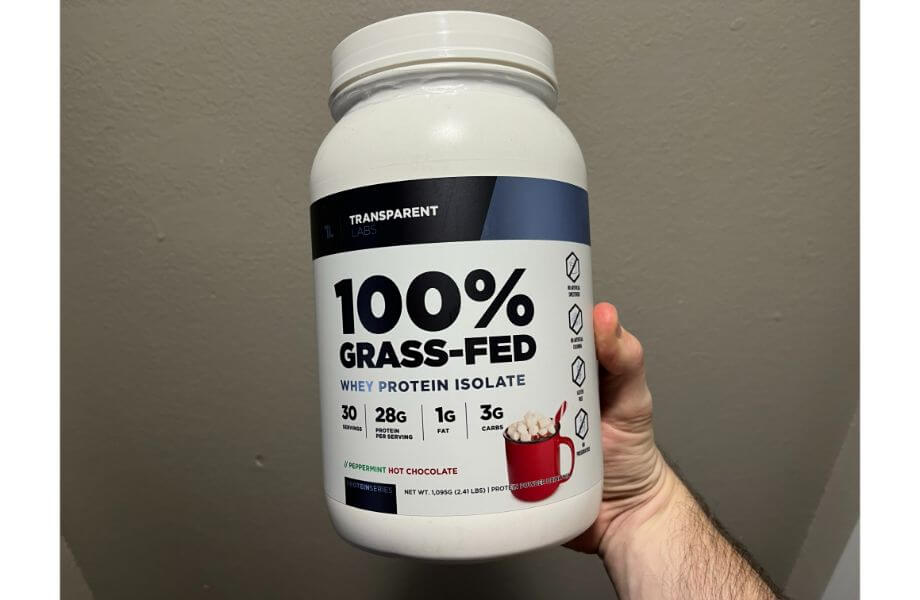
Whey protein1 and whey protein isolates are complete proteins because they provide all essential amino acids. Unlike non-essential amino acids, essential amino acids must be obtained from high-protein foods or protein supplements.
Whey is also rich in branched-chain amino acids2 (BCAAs), which may enhance post-exercise muscle recovery and function. It’s particularly a tremendous source of leucine—one of the three BCAAs—that plays a crucial role in protein synthesis and growth.
Also, whey protein isolates contain more protein than whey protein concentrates, which can help spur protein synthesis and muscle growth. Isolates also contain fewer carbs, fat, and lactose, making them a possible solution for anyone with lactose intolerance or dairy sensitivities.
While a study3 found that supplementing with whey protein isolate can increase muscle mass in combo with resistance training, it’s unclear if one over the other truly has the upper hand. Overall, the utmost importance is that you’re consuming adequate protein from a variety of high-quality sources.
And as far as any other ingredients, Transparent Labs whey protein isolate is a “clean” product free of artificial sweeteners, coloring, and preservatives. While dependent on flavor, Transparent Labs strives to include more natural ingredients like cocoa powder, stevia, and peanut flour.
All Transparent Lab products are third-party tested; you can even view their Certificates of Analysis and Composition on their website. If you want an even MORE in-depth guide to this muscle gainer, check out our complete Transparent Labs Protein Review.
| Main Protein Source(s) | Grass-fed whey protein isolate |
| Protein Per Serving | 28 g per 1-scoop (38.5 g) serving (Chocolate Peanut Butter) |
| Calories | 130-140 depending on flavor |
| Flavor Option(s) | Chocolate Peanut Butter, Cinnamon French Toast, French Vanilla, Milk Chocolate, Mocha, Oatmeal Chocolate Chip Cookie, Strawberry, Vanilla Peanut Butter |
| Cost | $59.99/30 servings = $2.00/serving |
| Sweeteners | Stevia |
Best Protein Powder for Muscle Gain Post-Workout: Jacked Factory Authentic ISO
Good for: Those who want a high dose of protein after hitting the weights
Best for Post-Workout
Jacked Factory Authentic ISO Grass-Fed Whey Protein
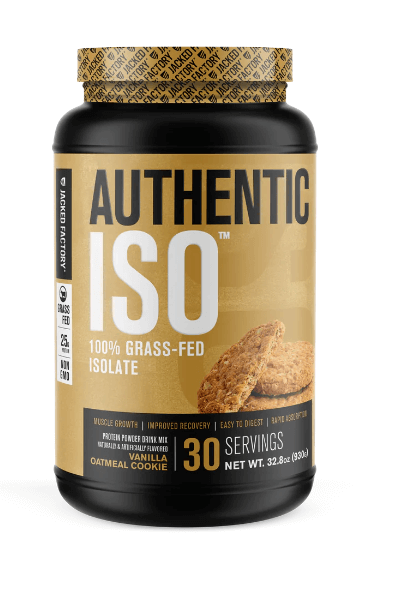
Product Highlights
- Three flavors
- 25g per scoop
- 110 calories per serving
- Under 1g of fat per scoop
Pros & Cons
Pros
- 25g of protein
- Only 110 calories per scoop
- Under 1g of fat per serving
Cons
- Ultra-sweet taste
- Sweetened with sucralose
- Leaves clumps and floaters
Bottom Line
The Jacked Factory Authentic ISO Grass-Fed Whey Protein comes very close to being pure protein, making it a great choice for those who are trying to meet their macronutrient goals. Plus, the price per serving is where this ISO shines. Keep in mind our testers found this whey isolate to be a little too sweet but it was not a dealbreaker.
Jacked Factory Authentic ISO provides 100% grass-fed whey protein isolate with 25 grams of protein per serving, which is the research-backed amount for those looking to build and preserve lean muscle mass. Also being a whey protein isolate, it contains minimal carbs (1 gram), fat (0.5 grams), and lactose.
The Jacked Factory protein also sports a tidy ingredients list that’s mostly filled with natural ingredients—like Himalayan salt and stevia extract—to enhance flavor. However, and while this is a personal preference on if you wish to consume, it does contain artificial flavors and the artificial sweetener sucralose. While customer reviewers did not think this was the best-tasting protein powder, our product tester begged to differ and thought the Vanilla flavor was very pleasant.
“To me this protein powder mixed with milk is and some ice is like a dessert,” certified personal trainer Lindsay Scheele says. “It tasted like a vanilla milkshake and was not too overly sweet or chalky.”
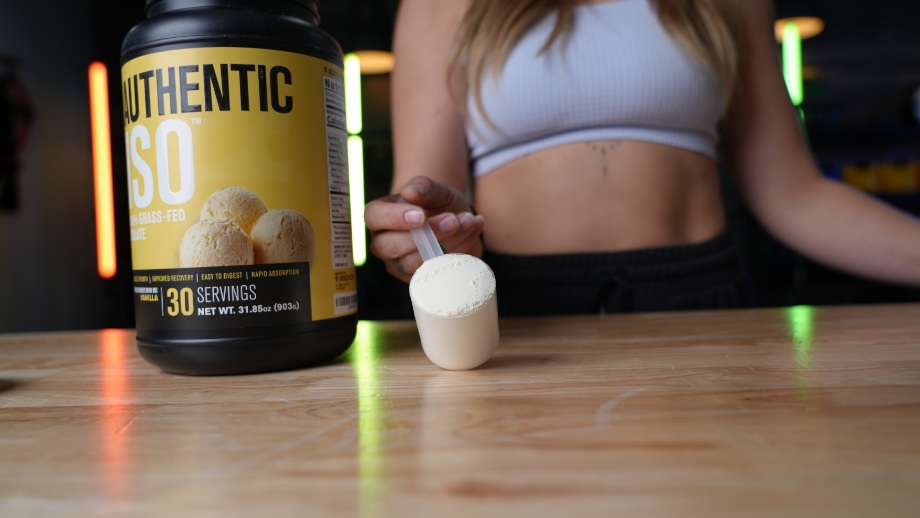
It does also come in Vanilla Oatmeal Cookie and Chocolate Peanut Butter as well.
You can snag Jacked Factory’s budget-friendly protein for just $1.33 per scoop or, better yet, $1.13 per scoop if you subscribe and save for 15% off (and free shipping)!
To ride Jacked Factory into the sunset, its grass-fed whey protein isolate is manufactured in the U.S. in a cGMP (Current Good Manufacturing Practice) and FDA-registered facility. And if you aren’t satisfied with the product for any reason, Jacked Factory offers a 100% hassle-free, money-back guarantee.
Read our Jacked Factory Authentic Iso Whey review for more of our thoughts about this product.
| Main Protein Source(s) | 100% grass-fed whey protein isolate |
| Protein Per Serving | 25 g per 1-scoop (30.1 g) serving (Vanilla) |
| Calories | 110-130 depending on flavor |
| Flavor Option(s) | Chocolate Peanut Butter, Vanilla, Vanilla Oatmeal Cookie |
| Cost | $39.99/30 servings = $1.33/serving |
| Sweeteners | Sucralose, stevia extract |
Best Natural Protein Powder for Muscle Gain: Legion Whey+
Good for: Those who want a protein powder free of artificial ingredients
Best Natural
Legion Whey+
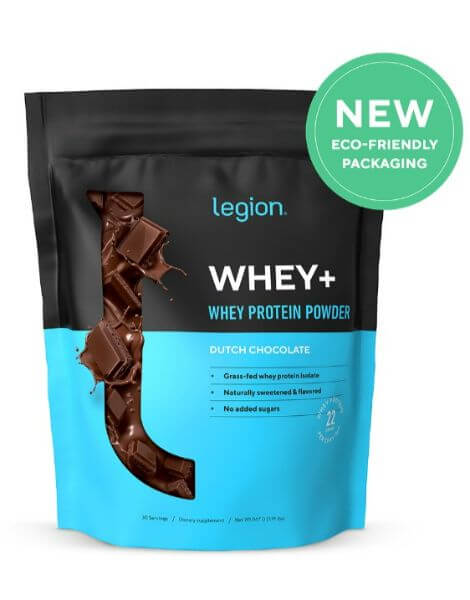
Product Highlights
- Sourced from small dairy farms in Ireland
- Over 5 g of BCAAs per serving
- Non-GMO and animal welfare approved
- Third-party tested for banned substances
Pros & Cons
Pros
- Low in carbs and fat
- Natural ingredients
- Money-back guarantee
- Made with ethically-sourced milk
- Lots of flavor options
Cons
- Comparably high cost per serving
- May be clumpy when mixed
- Some flavors have mixed reviews
Bottom Line
Legion Whey+ is a clean, sustainable protein powder that also is macro-friendly and a great option for anyone looking for a clean protein supplement. Many of our testers have bought this with their own money because they love the taste and easy mixability.
Legion’s commitment to using all-natural ingredients begins with all-natural cows who graze on grass instead of artificial feed filled with artificial ingredients. Cows that eat grass produce milk that has more nutrients than dairy from grain-fed cows. Plus, it gives us peace of mind that there are no hormones or other junk in our protein powder.
Each batch is tested by Labdoor, a third-party laboratory that ensures the protein supplements are free of any heavy metals, toxins, or banned substances that might cause athletes to fail a drug test. Although rare, there have been cases when athletes have ingested banned materials through a supplement such as protein powder or pre-workout.
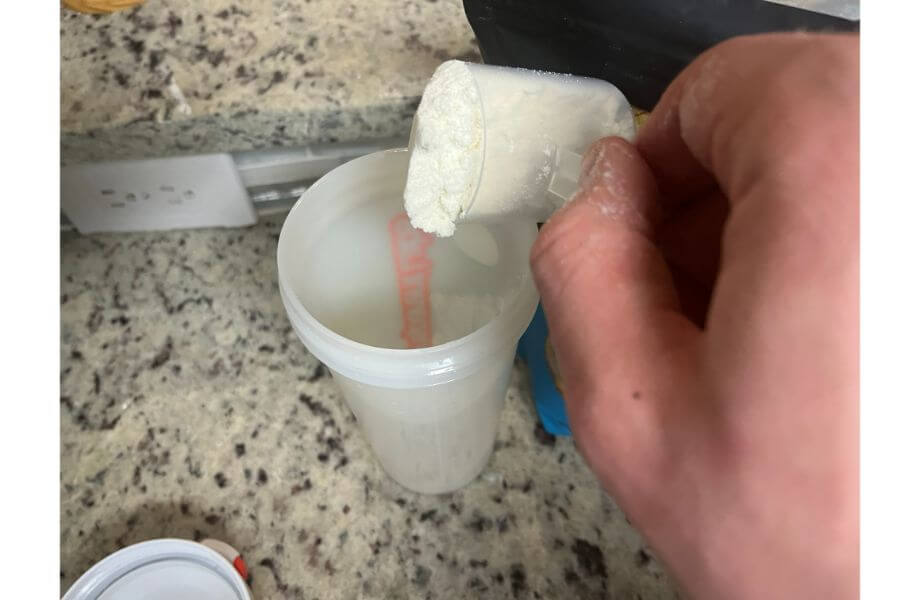
The Whey+ protein powder comes in 17 different flavors, and while we haven’t tried them all the ones we have tested are some of the tastiest protein powders on the market. Anthony O’Reilly, a protein powder connoisseur and GGR’s performance editor, says the Cinnamon Cereal tastes exactly like the milk that’s at the bottom of a bowl of Cinnamon Toast Crunch. (You can read more about this experience with this product in our Legion Whey Protein Review, by the way.)
Last thing to note: The protein content varies by flavor, but you can expect anywhere from 22 to 25 grams of protein with a minimal amount of carbs and fat.
RELATED: Best Clean Protein Powder
| Main Protein Source(s) | Grass-fed whey protein isolate |
| Protein Per Serving | 22-25 g depending on flavor |
| Calories | 100-120 depending on flavor |
| Flavor Option(s) | 17 |
| Cost | $59.99/30 servings = $1.99/serving |
| Sweeteners | Stevia leaf extract, monk fruit extract |
Best-Tasting Protein Powder for Muscle Gain: XWERKS Grow
Good for: Lifters who enjoy the finer flavored things proteins in life
Best-Tasting
XWERKS Grow
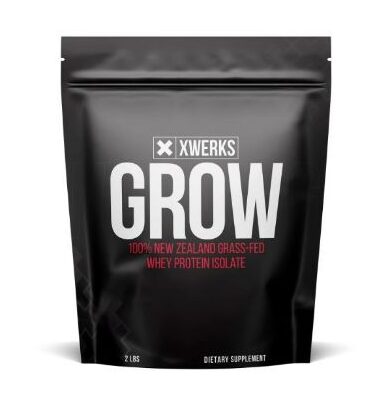
Product Highlights
- Natural, healthy, convenient, and tasty way to get protein
- Uses a microfiltration process to preserve critical biological nutrients in raw whey
- Removes unwanted fats and carbohydrates
- All flavors are naturally sweetened
- Nicely flavored, easily digested, and low-carb protein powder
- Promotes muscle growth and repair
Pros & Cons
Pros
- Keto-friendly
- Naturally sweetened
- Sourced from naturally raised grass-fed cows
- Has a smooth and creamy taste
- Soy- and gluten-free
- Convenient
Cons
- Expensive
Bottom Line
XWERKS Grow whey protein isolate provides a solid blend of amino acids, vitamins, and minerals in a whey protein isolate. Our testers have said this is one of the best-tasting protein powders they've tried, and they've had more than 100.
With a name like XWERKS Grow, how could it not land on our list of the best protein powders for muscle gain?
XWERKS Grow is another grass-fed whey protein isolate sourced explicitly from grass-fed cows from New Zealand. According to XWEKS, New Zealand is one of the strictest countries in the world regarding dairy quality, and you need not worry about hormones, antibiotics, or pesticides passed onto you.
The whey protein isolate supplies 25 grams of protein per scoop with over 6 grams of BCAAs. XWERKS Grow also provides the protein powder’s complete amino acid profile if you’re interested in the breakdown.
XWERKS Grow comes in four simple, classic flavors: Chocolate, Peanut Butter, Strawberry, and Vanilla. GGR performance editor and expert product tester Anthony O’Reilly highly enjoys XWERKS Grow and finds that the chocolate flavor tastes like a “protein Yoo-hoo.”
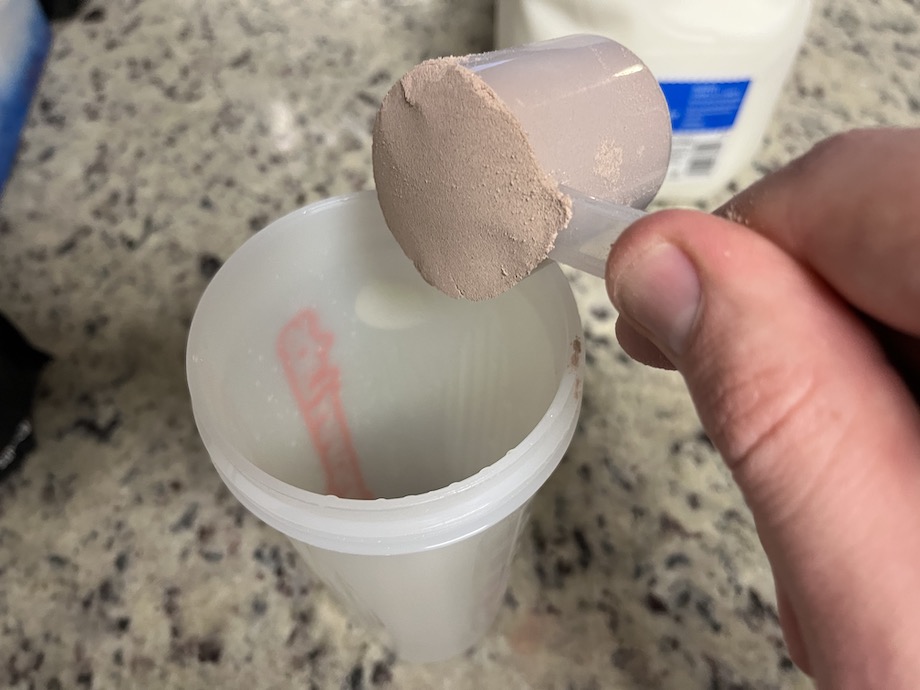
Each XWERKS Grow flavor is free of artificial sweeteners, flavors, coloring, soy, and gluten. They’re all naturally sweetened and flavored with ingredients like cocoa and vanilla beans, although they do contain xanthan gum which could cause tummy troubles in some consumers.
XWERKS does cost almost $2.00 per serving, although you can save 5% using their subscribe and save option. They also offer free shipping and a 100% money-back guarantee if you aren’t completely satisfied.
Our XWERKS Grow whey protein review provides even more detail about this protein powder.
| Main Protein Source(s) | 100% grass-fed whey protein isolate |
| Protein Per Serving | 25 g per 1-scoop (30 g) serving (Chocolate) |
| Calories | 110 |
| Flavor Option(s) | Chocolate, Peanut Butter, Strawberry, Vanilla |
| Cost | $59.00/30 servings = $1.97/serving |
| Sweeteners | Stevia |
Best Vegan Protein Powder for Muscle Gain: Ritual Essential Protein 18+
Good for: Those looking for a vegan-friendly, but still high-protein supplement
Best Vegan
Ritual Essential Protein Daily Shake 18+
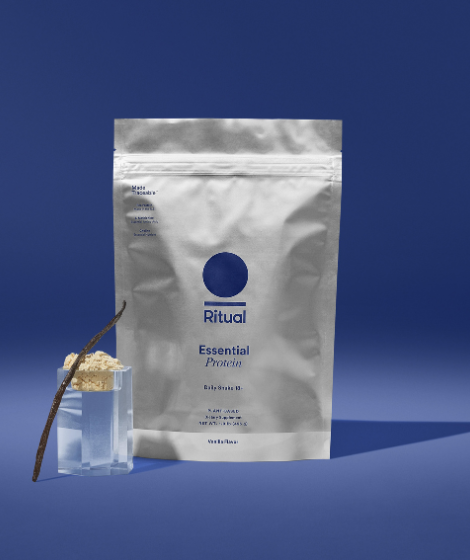
Product Highlights
- Organic pea protein powder
- 20 g of protein per serving
- Formulated to support adults 18-49
- Third-party tested
- 150 mg of choline per serving
Pros & Cons
Pros
- Soy-free, gluten-free, and vegan-friendly
- No artificial sweeteners
- Complete amino acid profile
- Non-GMO
- USA-grown peas
Cons
- Only comes in one flavor
- Price per serving is on the high end
- Velcro bag closure ineffective
Bottom Line
Ritual’s Essential Protein Daily Shake 18+ is specifically designed for 18-to-49 year-olds with 20 grams of protein per serving and 150 milligrams of chlorine (to support brain and nervous system function). This protein powder from Ritual is third-party tested and Informed Sport Certified, which means this formula has been screened for over 250 banned substances.
With 20 grams of protein and only 115 calories per scoop, Ritual Essential Protein 18+ is a great—and tasty—option for those who may not want too much protein in their diet. The lower calorie content can help you put on muscle without putting on too much size so you don’t do a Hulk Hogan impression each time you put on a suit.
Some people might see that this protein powder is made with pea protein and be wary, and we’d understand that. After all, pea protein lacks the research-backed amount of the amino acid methionine and can’t be considered a complete protein. Ritual fixes this by adding enough methionine to their supplement to up the protein quality.
Competitive weightlifter and GGR senior director of content Kate Meier says the Vanilla protein powder is a 4 out of 5 on taste when mixed with water or smoothies (her morning shake consists of water, strawberries, blueberries, and this protein powder). “The vanilla taste is definitely detectable, but not overly strong,” Kate says.
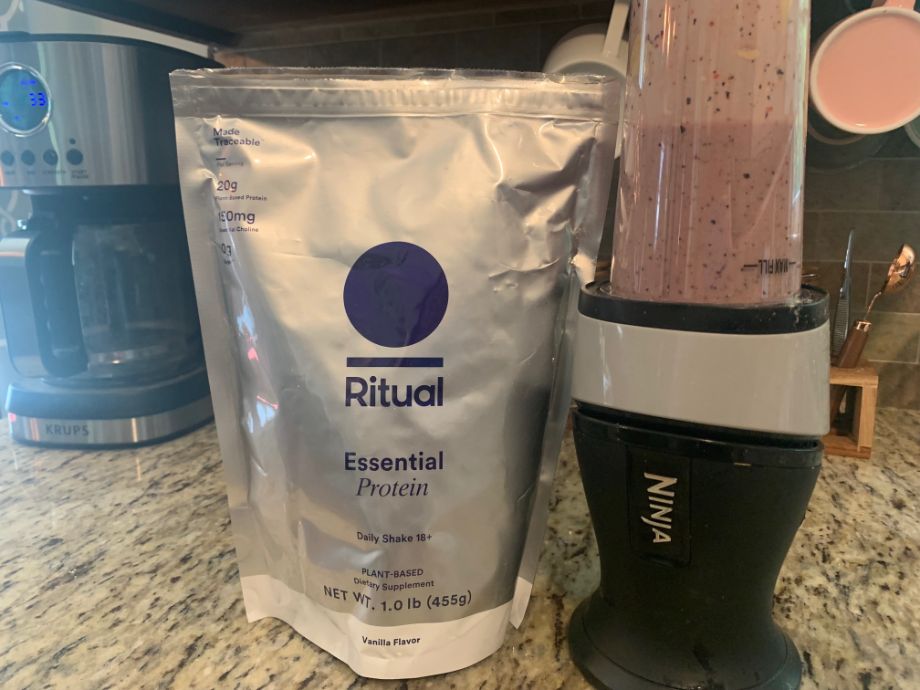
The solubility shocked Kate and earned an instant 5 out of 5. “It’s not thick, but it’s not watery like some proteins are,” she says.
RELATED: Benefits of Glutamine
It’s a subscription-based company, though there is a 30-day money-back guarantee if you decide to try it and don’t like it. Canceling or pausing your shipments can also be done right on their website. Our Ritual protein powder review details more about the pros and cons of this product.
| Main Protein Source(s) | Pea protein |
| Protein Per Serving | 20 g per 1 scoop |
| Calories | 120 |
| Flavor Option(s) | Vanilla |
| Cost | $40/15 servings = $2.67 |
| Sweeteners | Monk fruit |
Best Budget Protein Powder for Muscle Gain: Nutricost Whey Protein Concentrate
Good for: Gaining muscle without losing out on (much) money
Best Budget
Nutricost Whey Protein Concentrate
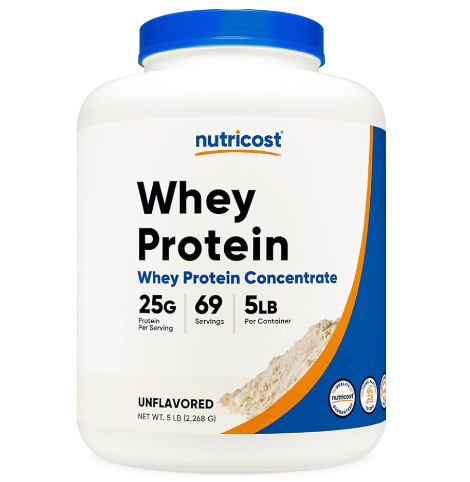
Product Highlights
- 25 grams of whey protein concentrate per serving
- Available in 5 flavors, including unflavored
- High-quality ingredients and third-party testing
- Supports lean muscle growth and recovery after workouts
Pros & Cons
Pros
- Non-GMO and gluten-free
- Manufactured in GMP-compliant facility
- Unflavored option only contains one ingredient, instantized whey protein concentrate
Cons
- Whey concentrate may not mix as well as whey isolate
- Flavored options are higher in calories than other whey proteins
Bottom Line
Nutricost Whey Concentrate contains 25 grams of high-quality whey protein concentrate, available in five flavors. It's gluten-free, non-GMO, manufactured in a GMP-compliant facility, and third-party tested.
If you’re looking to keep your muscles and wallet as full as possible, consider Nutricost Whey Protein Concentrate. A 5-pound container of the Unflavored protein powder, for example is 78 cents while a 2-pound container of Strawberry Milkshake will only run you around $1.28, both of which are good enough to get a 5 out of 5 on our pricing rating scale.
While this is a cheap protein powder in terms of cost, it doesn’t taste like one. GGR senior director of content and weightlifting coach Kate Meier gave the Chocolate Peanut Butter a 5 out of 5, and it’s one of the few protein supplements she’s given a perfect rating.
“I don’t love peanut butter, and I wasn’t too jazzed about trying the Chocolate Peanut Butter flavor,” she admits. “But the peanuty flavor is just right — not too powerful and doesn’t overpower the chocolate. I really, really liked it.”
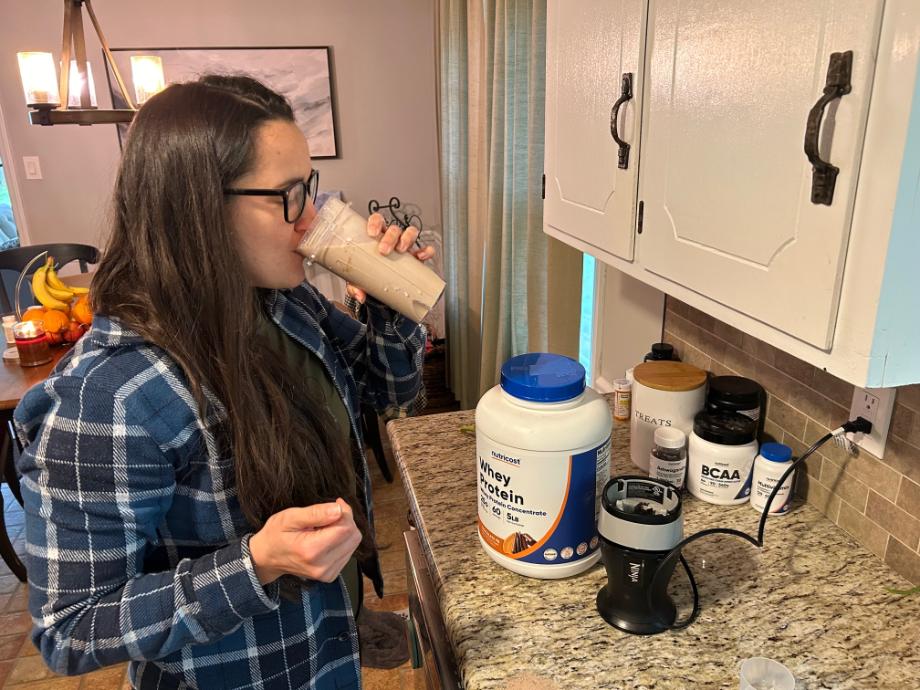
Plus, Nutricost is third-party tested for harmful and banned substances and is free of GMOs and gluten. Its formulation gets a 4 out of 5 because the protein content (25 grams per serving) is larger than the moderate amount of carbs and fats (the exact number of which varies by flavor). We docked a point because the flavored versions contain some artificial ingredients, though the Unflavored one only contains whey protein concentrate and sunflower lecithin (a natural emulsifier).
Registered dietitian Perry Nix notes whey protein concentrate may upset some people’s stomachs because of the higher lactose content, but Kate says there were no such issues.”My partner has stomach issues with some proteins, but he didn’t experience any with this one,” she says.
We have more details on this budget-friendly protein in our Nutricost Whey Protein Concentrate review.
| Main Protein Source(s) | Whey protein concentrate |
| Protein Per Serving | 25g per 1 scoop |
| Calories | 130-140 depending on flavor |
| Flavor Option(s) | Vanilla, Chocolate, Strawberry Milkshake, Chocolate Peanut Butter, Unflavored |
| Cost | $0.78-$1.26 per serving (varies by flavor and container size) |
| Sweeteners | Sucralose (in flavored versions) |
Best Grass-Fed Protein Powder for Muscle Gain: Momentous Grass-Fed Whey
Good for: Lifters who are extra cow-gnizant about the sourcing and quality of their protein powder
Best Grass-Fed
Momentous Grass-Fed Whey
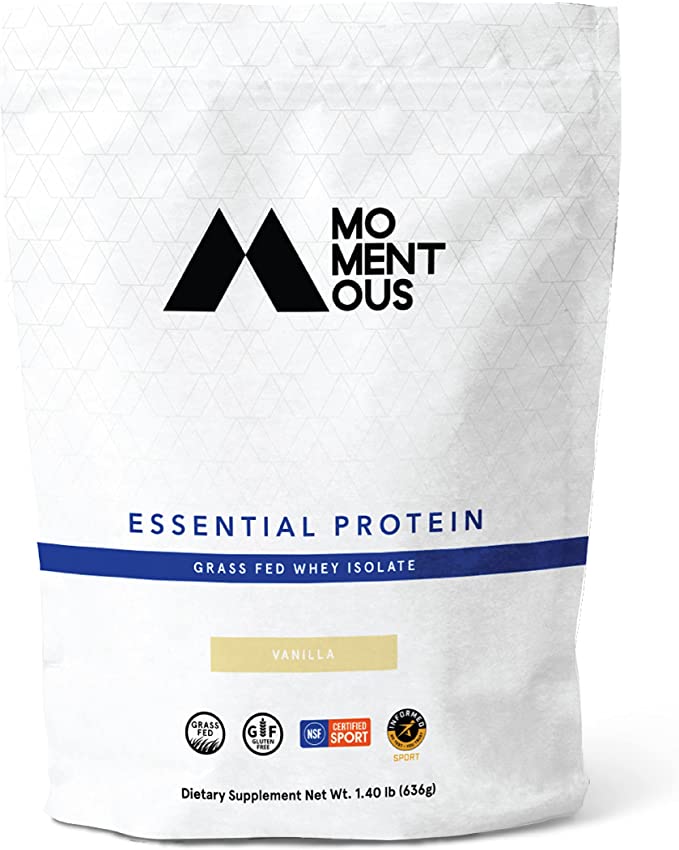
Product Highlights
- Grass-fed whey protein isolate
- Cold-pressed with a micro-processing filtration
- ProHydrolase enzyme blend
- Protein is sourced from Irish cows
Pros & Cons
Pros
- Clean ingredients
- Third-party verified
- Mixes well
- High-quality
- Bioavailable
Cons
- Unflavored may clump when mixing
- Expensive
Bottom Line
If you are willing to pay a premium price for a high-quality grass-fed whey protein, the Momentous brand is a solid choice. It is cold-pressed and put through a micro-processing filtration which is supposed to preserve the protein’s amino acid profile. While we cannot confirm that, we know it tastes darn good and did not upset any stomach during our testing.
If you can’t tell by cow now, we lean toward high-quality protein sources like grass-fed whey. And claiming themselves to be “the highest-quality whey protein on the market, period” makes us want to see if it’s really worth crying about till the cows come home.
Momentous Grass-Fed Whey is a no-fuss, no-bull product that provides about 20 to 23 grams of protein per serving (depending on the flavor or lack thereof). The grass-fed whey is sourced from Irish cows that are raised on grass-based diets without growth hormones. Every cow used in production is also traceable from the exact farm where it was raised, allowing for full transparency and accountability in the production process.
The whey protein isolate is also cold-processed to preserve native protein structures, thus allowing for greater amino acid bioavailability. A 2020 review published in Foods8 tells us that cold filtration can improve quality and reduce the denatured protein of whey.
It also contains 200 milligrams of ProHydrolase® to enhance digestion and absorption of the protein. Momentous also claims to use the clinically-tested dose of 10 mg of ProHydrolase per 1 g of protein to minimize bloat but maximize amino acid absorption—and this is documented on the official ProHydrolase spec sheet.
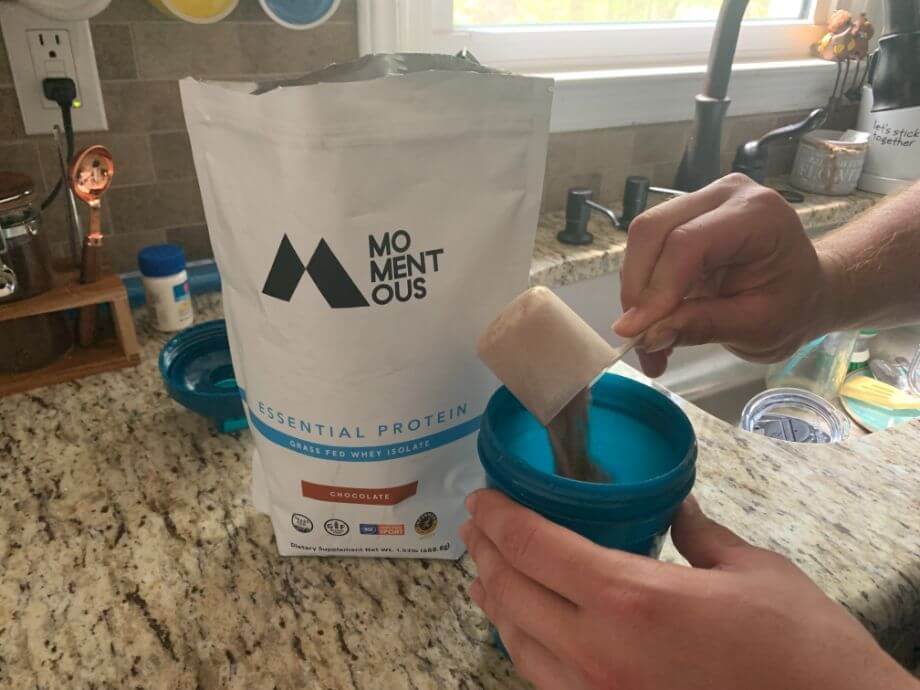
The grass-fed whey protein isolate comes in two flavors—Chocolate and Vanilla—and an unflavored option that can be mixed in your liquid or baked into goods for a protein boost. All three options are free of added sugar, gluten-free, and soy-free. GGR’s senior director of content Kate Meier is on a weightlifting team, and her teammate Hunter tried the chocolate version of Momentous. “It has a rich taste, very much like cocoa; it tastes a lot like hot chocolate (only we mixed it with ice cold water). I would buy this again based on taste alone—it goes down really smoothly.” (Read more about our experience in our Momentous Essential grass-fed whey protein review.)
Momentous products are also third-party tested, specifically rocking the NSF Certified Sport and Informed-Sport logos, and come with a money-back guarantee. You can also save about $10 per container if you subscribe to a recurring order with one, two, or three-month delivery options—and you might need these savings, as this protein powder is expensive, costing about $60 a bag.
| Main Protein Source(s) | Grass-fed whey protein isolate |
| Protein Per Serving | 20 g per 1-scoop (26.5 g) serving (Vanilla) |
| Calories | 90-100 depending on flavor |
| Flavor Option(s) | Chocolate, Unflavored, Vanilla |
| Cost | $59.50/24 servings = $2.48/serving |
| Sweeteners | Stevia |
Best Personalized Protein Powder for Muscle Gain: Gainful
Good for: Anyone who wants a protein powder made just for them and is willing to pay extra for it
Best Personalized
Gainful Customized Protein
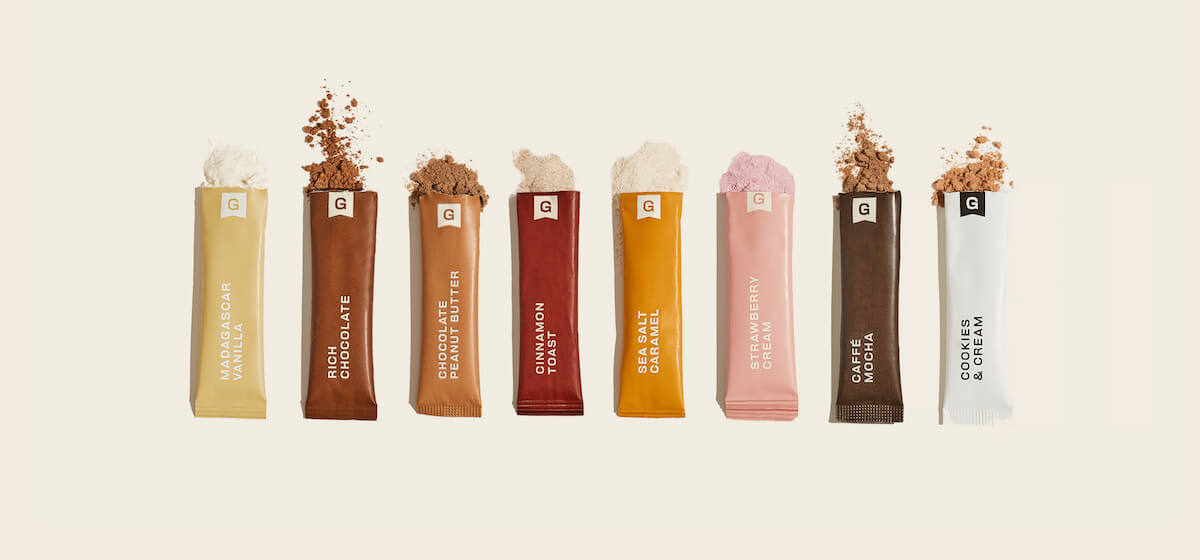
Product Highlights
- Specifically formulated for you
- Choose from a variety of flavor boosts
- Contains all 9 essential amino acids
- Tailored to meet your dietary needs
- Subscription-based service renews each month
- Unlimited access to registered dieticians
Pros & Cons
Pros
- High-quality ingredients
- Ability to work with registered dietitians
- Personalized to your needs and goals
- Solid profile of amino acids
- No gluten, soy, artificial sweeteners, or dyes
Cons
- Subscription-based
- Expensive
Bottom Line
Gainful protein powder is a subscription-based supplement that is personalized by dietitians to meet your specific needs and health goals. Your subscription will even gain you access to dietitians We enjoyed the personalized formula, taste, and solubility of Gainful but it is a pricey product that will not be suitable for everyone.
Your health needs and fitness goals are personal, and Gainful recognizes and accommodates just that. In fact, in addition to the growing popularity of plant-based and vegan diets, personalized food is a driving force behind an anticipated growth in protein powders within the next decade, according to a Global Market Insights report.
Everyone will have their own unique ordering experience through the Gainful website, but you’ll be asked a series of questions—like the gender you identify as, various dietary preferences and restrictions, and your nutrition goals and activity levels. Collecting this info will help customize your calorie needs and the type of protein powder you receive.
I was personally welcomed with an unflavored whey-casein blend, which served as a base for single-serving “Flavor Boosts.” Because there are 28 servings in my provided protein, and seven flavor servings per pack, I had the freedom to choose four different flavor packs—Sea Salt Caramel, Cookies & Cream, and Madagascar Vanilla are three of the eight flavor options.
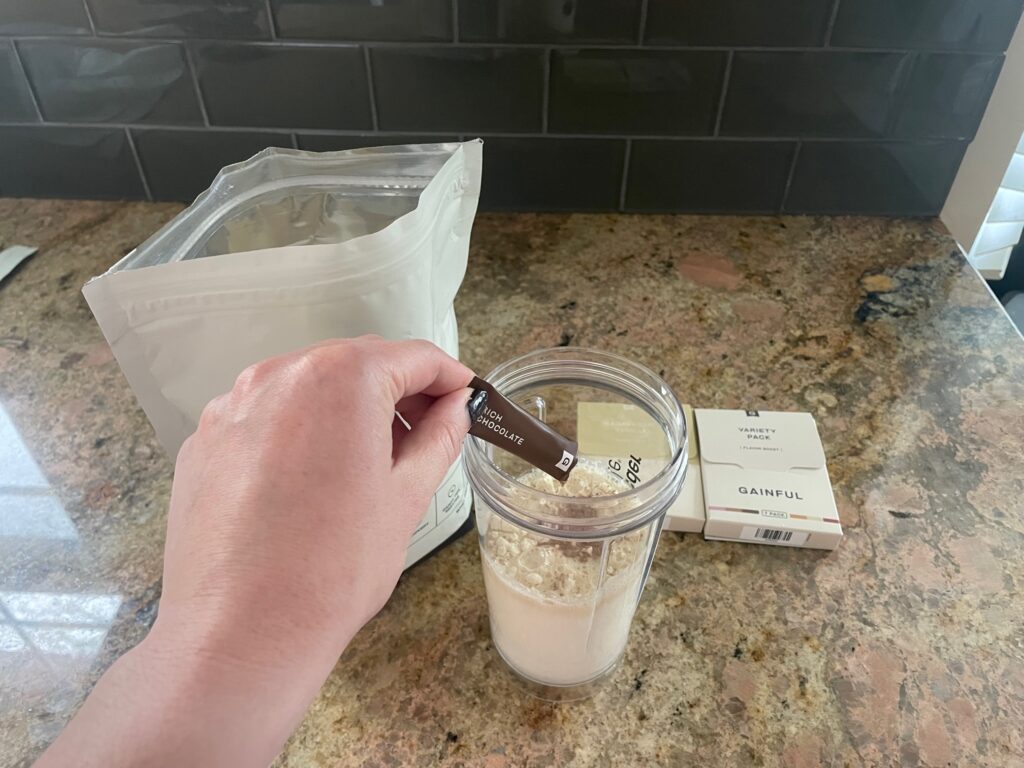
If the flavors sound as appetizing as they did for me, you can also elect for a Variety Pack to sample more variety. Oh, and flavors only add upwards of 10 calories to your custom protein powder blend.
It’s also worth adding that with a subscription-based service, you’ll gain complimentary access to a Registered Dietitian. As a fellow dietitian, I love that consumers are getting expert and personalized guidance to meet their unique health goals and needs.
With your subscription, you’ll also unlock Gainful Rewards so you can save on future orders. They also offer “Appreciation Tier Verification” to students, military, healthcare workers, and first responders.
Gainful also offers a “Happiness Guarantee,” so you can get a new one for free if you don’t love your formula. Speaking of happiness, it also makes us happy that all of their products are manufactured in an FDA-compliant, cGMP-approved facility and require all of their manufacturers to provide COAs (Certificate of Analyses) for each ingredient.
Read our Gainful protein powder review for more information.
| Main Protein Source(s) | Whey, keto, and plant-based options (will vary based on your custom needs) |
| Protein Per Serving | 19-27 g depending on your custom selection |
| Calories | 110-140 depending on your custom selection |
| Flavor Option(s) | Caffé Mocha, Chocolate Peanut Butter, Cinnamon Toast, Cookies & Cream, Madagascar Vanilla, Rich Chocolate, Sea Salt Caramel, Strawberry Cream |
| Cost | Starting at $45.00 with 14-28 servings/container |
| Sweeteners | Monk fruit, organic stevia leaf extract |
Best Protein Powder for Weight Gain: Sports Research Whey Protein
Good for: People wanting a protein powder with a high protein content that also tastes great
Best for Weight Gain
Sports Research Whey Isolate
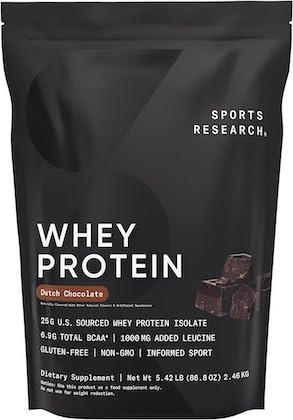
Product Highlights
- Whey protein isolate
- 25 g of protein per serving
- Available in chocolate or vanilla
- Informed Choice-certified
Pros & Cons
Pros
- Affordable
- Third-party tested
- 25 grams of protein per serving
Cons
- Only two flavors available
- Our tester had issues with solubility
Bottom Line
Sports Research whey protein isolate has 25 grams of protein per serving and just 150 calories. It's third-party tested, too. Although there are only two flavors available, our testers think it's worth a try.
Sports Research Whey Protein Isolate has become a favorite among the GGR staff. It has 25 grams of protein per serving and tastes especially great in smoothies, which you may want to make often if you’re trying to increase your daily caloric intake. GGR performance editor and certified personal trainer Anthony O’Reilly gave the Dutch Chocolate flavor 5 out of 5 stars for taste, noting, “The taste reminds me of an instant cocoa powder beverage. I would put marshmallows in it and drink it by a campfire.”
Anthony also blended this protein powder with strawberries, bananas, and milk, and likened it to a Valentine’s Day treat. However, he gave it a lower score of 3.5 stars for solubility. “There was some clumping at the bottom of my blender bottle, even after some additional shaking,” he reported.
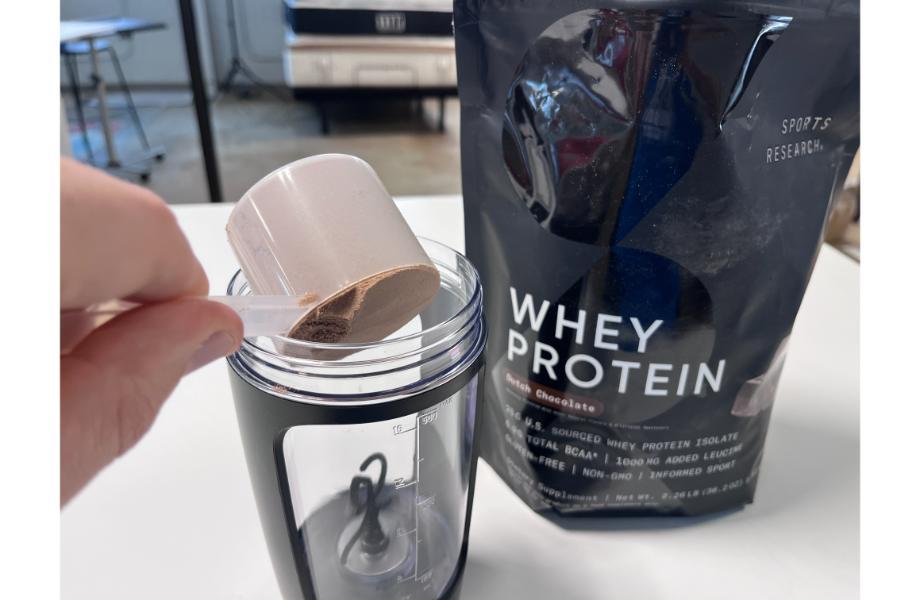
Sports Research’s protein has 3.5 to 4 grams of fat and 2 to 4 grams of carbs per serving. While these are relatively small amounts, they do contribute to a higher number of calories—140 for the Vanilla flavor and 150 for the Dutch Chocolate. Many protein powders we’ve tried that are made with whey isolate have around 110 calories. But when you’re trying to gain weight, those extra calories may be needed.
Overall, this higher calorie protein powder is a win. We have more details about the formulation in our in-depth Sports Research Whey Protein review.
Another reason we like Sports Research Whey Protein Isolate as the best protein powder for weight gain? It contains 1,000 milligrams of added leucine. A 2017 study in Frontiers in Physiology9 suggests that leucine plays an important role in the growth and preservation of muscle mass.
| Main Protein Source(s) | Whey protein isolate |
| Protein Per Serving | 25 g per 1 scoop (Vanilla) |
| Calories | 140-150 depending on flavor |
| Flavor Option(s) | Creamy Vanilla, Dutch Chocolate |
| Cost | $37.95/26 servings = $1.46/serving (Vanilla) |
| Sweeteners | Steviol glycosides |
Best Casein Protein Powder for Muscle Gain: Transparent Labs Casein
Good for: Keeping your muscles fed for hours on end
Best Casein
Transparent Labs Casein Protein
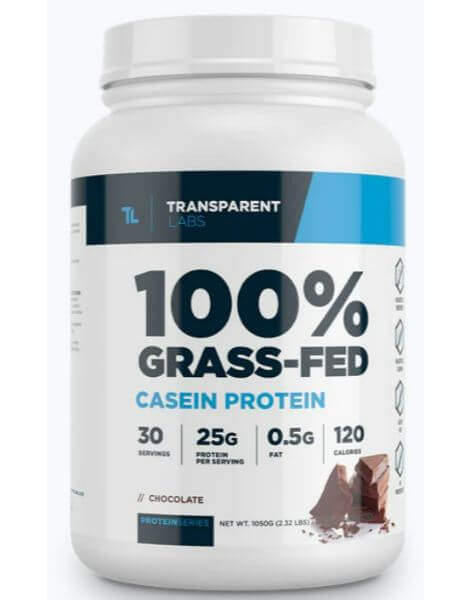
Product Highlights
- 100% grass-fed casein protein
- 3rd-party lab tested
- Chocolate flavor
Pros & Cons
Pros
- Subscribe and save 10%
- No artificial sweeteners, coloring, or preservatives
- 3rd-party lab tested
- Transparent ingredients
- Extremely positive reviews on taste
Cons
- Only available in 1 flavor
- May be sold out
- Comparably expensive
- Limited reviews
Bottom Line
Transparent Labs Casein Protein provides 25 grams of protein per scoop and is extremely popular among users. Unfortunately, it may be sold out when you try to buy it, but you can sign up to be notified when it is available again.
Transparent Labs brings its high-quality casein powder to the table, which you can read all of the nitty-gritty about in our Transparent Labs casein protein review. And really, given their commitment to quality and transparency, it’s no surprise it made our best casein protein powder list.
While another grass-fed formula, this Transparent Labs protein contains instantized micellar casein protein. Compared to whey protein, which is known as fast-acting, casein is slow-acting and specifically promotes a slow release of amino acids.
Now whether or not casein is better for muscle growth is up for debate, especially considering it promotes satiety and is often used as one of the best protein powders for weight loss. However, whey proteins can also help you lose weight.
What’s more, 40 grams of casein after an evening resistance training session, and about 30 minutes before bed, is an effective strategy to facilitate muscle recovery. And research suggests casein and whey elicit similar increases14 in muscle protein net balance.
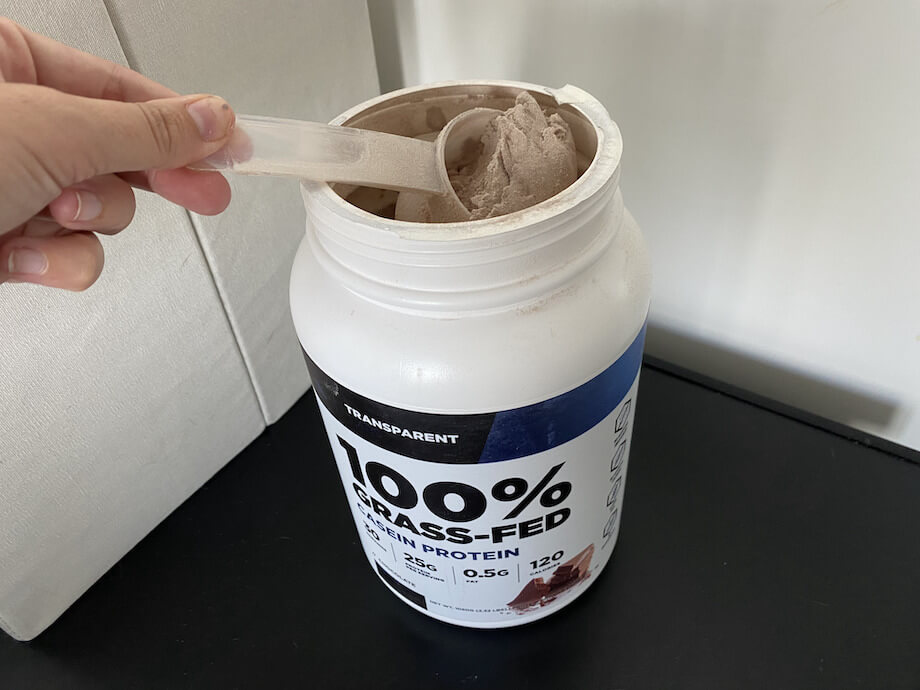
Overall, both proteins have their time and place. And the utmost importance isn’t exactly which protein source is best, but that you consume sufficient protein—from high-quality sources—to support your muscle growth and health goals.
But moving a-whey from the fast-digesting protein and back to regular programming, the casein protein is also free of “artificial junk” like artificial sweeteners, fillers, and dyes. Chocolate, the only available flavor (at least at this time), is naturally sweetened and flavored with cocoa powder, Himalayan rock salt, and stevia extract. GGR staff writer Amanda Capritto tested this and said, “This stuff tastes damn near like Jell-O chocolate pudding out of the little plastic tubs when mixed to mimic pudding. It’s so good! I actually crave this.”
And like we’ve already mentioned, you can even view all of Transparent Labs’ Certificates of Analysis and Composition that genuinely capture their commitment to transparency. And to extra seal the deal (once again), all Transparent Lab products are third-party lab tested.
| Main Protein Source(s) | Grass-fed micellar casein protein |
| Protein Per Serving | 25 g per 1-scoop (35 g) serving |
| Calories | 120 |
| Flavor Option(s) | Chocolate |
| Cost | $59.99/30 servings = $2.00/serving |
| Sweeteners | Stevia extract |
Best Whey Protein Powder for Muscle Gain: 1st Phorm Phormula 1
Good for: Gym-goers looking for whey isolate low in carbs and fats with tons of flavors
Best Whey
1st Phorm Phormula-1
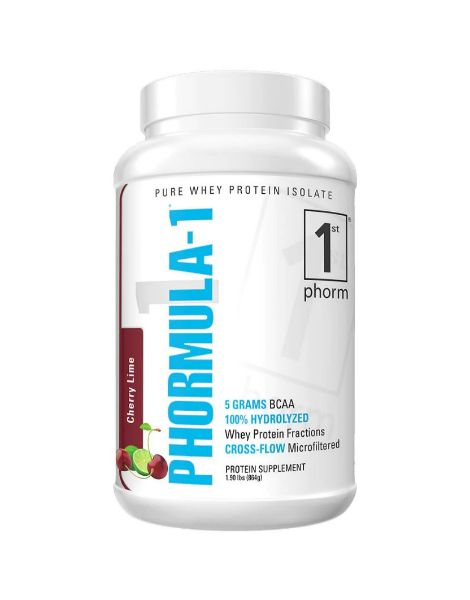
Product Highlights
- Premium-sourced whey protein isolate
- 20 grams of protein per serving
- Low in fats and carbs
- More than 10 flavor options
- Recommended to pair with 1st Phorm Ignition
Pros & Cons
Pros
- Tons of flavors
- Good-tasting
- Hydrolyzed and predigested whey protein
- Use before or after workout
- Mixes well
Cons
- Contains sugar
- Expensive
- Too thick for some
Bottom Line
If you like variety in flavors and don’t mind paying top dollar, Phormula-1 is a high-quality whey protein powder. Our testers like the taste and report no clumping with Phormula-1. It is also third-party tested by Informed Choice.
If you’re counting macros the 1st Phorm Phormula 1 whey protein isolate can provide the protein you’re looking for without tons of extra carbs and fats. Per serving, Phormula 1 provides 20 grams of protein, one gram of fat (or less), and two or three grams of carbohydrates depending on which flavor you choose.
Speaking of flavors, 1st Phorm offers more than 10 different whey isolate options including staples like Vanilla Milkshake and Chocolate Milkshake in addition to more unique flavors like Juicy Watermelon and Orange Dreamsicle.
I tried the Chocolate Mint Cookie flavor and found it mouth-watering. It’s delicious mixed with milk and tastes like a thin mint. It’s not a flavor I would choose to drink after my workout, but it would be an excellent dessert-style protein.
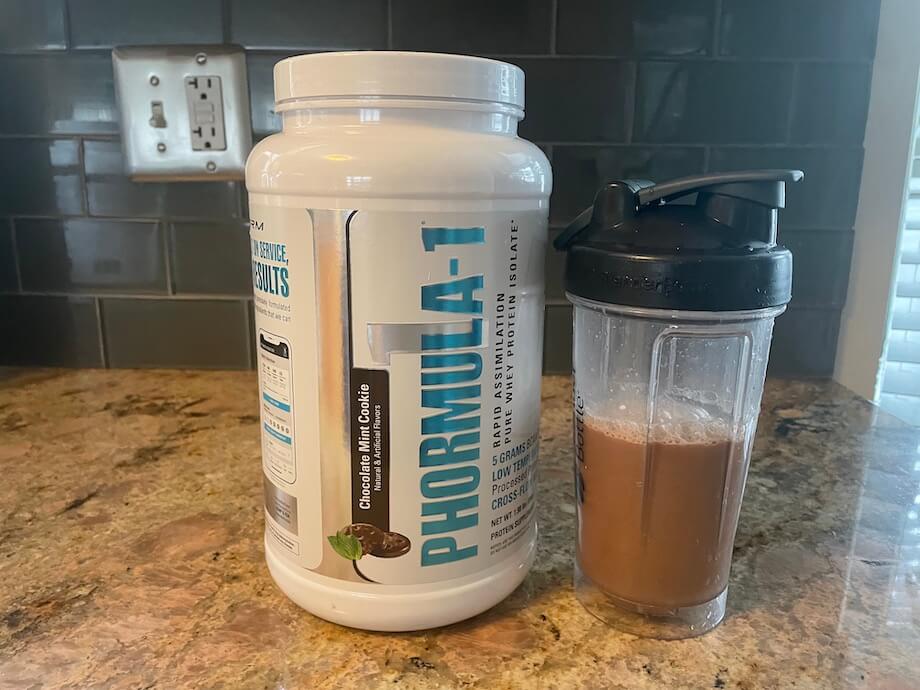
Phormula 1 is also third-party tested with seals of approval from NSF Certified Sport and Informed-Sport on the packaging. And if you’re not happy with your purchase, 1st Phorm has a 110% money-back guarantee that will refund your purchase with an additional 10% on top if you make a return within 30 days of receiving your order.
1st Phorm also offers $5 off your protein order when you subscribe. We have details on our ordering experience in our in-depth 1st Phorm Protein review.
| Main Protein Source(s) | Whey protein isolate |
| Protein Per Serving | 20 g per 1-scoop (32 g) serving |
| Calories | 100-110 depending on flavor |
| Flavor Option(s) | Salted Peanut Butter, Cafe Mocha, Cafe Latte, Cherry Lime, Chocolate Milkshake, Chocolate Mint Cookie, Fruit Punch, Juicy Watermelon, Loop D Fruit, Magical Charms, Root Beer Float, Vanilla Milkshake, Orange Dreamsicle, Key Lime Pie |
| Cost | $64.99/32 servings = $2.03/serving |
| Sweeteners | Sugar, sucralose |
Best Plant-Based Protein Powder for Muscle Gain: Vega Sport Plant Protein
Good for: Plant-based dieters searching for a robust protein source to support muscle-gaining goals
Best Plant Protein
Vega Sport Premium Protein
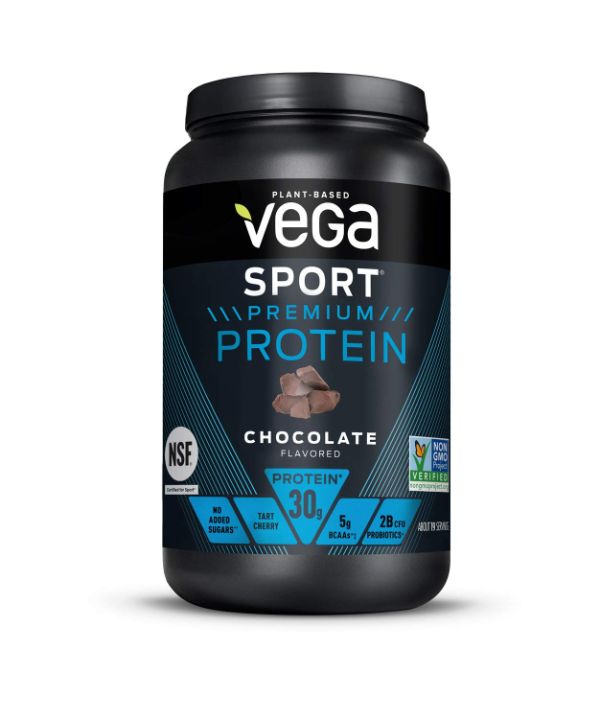
Product Highlights
- Multi-source vegan protein powder
- NSF Certified for Sport, vegan, and gluten-free
- Includes BCAAs, probiotics, and tart cherry
Pros & Cons
Pros
- 30 grams of protein per serving
- Contains all essential amino acids but two that are made by the body
- 5 flavor options
- Supports recovery with tart cherry, probiotics, and turmeric extract
Cons
- Customers share new formula doesn’t blend well
- Pricey at over $2 per serving
Bottom Line
Vega Sport Protein is plant-based, third-party tested, and gluten-free, making it suitable for a wide variety of people. One scoop provides 30 grams of vegan-friendly protein. Our testers report taste and blendability is not comparable to whey protein, but far better than other vegan-friendly options on the market.
Vega Sport is our top pick as a vegan muscle gainer for a few mighty reasons. For one, it packs a whopping 30 grams of plant-based protein with each scoop.
RELATED: Best vegan protein powder
The amino acid profile also tells us that Vega Sport is a complete protein—meaning it contains all nine essential amino acids——thanks to its blend of pea, pumpkin seed, sunflower seed, and alfalfa proteins. This is an important consideration, as most vegan protein sources tend to be incomplete proteins.
It also provides 5 grams of BCAAs, 2.25 grams of which are leucine, although the leucine content isn’t considered enough to maximize muscle growth. But increasing the serving size, supplementing with the best BCAAs on the market, and/or pairing with another protein-rich food source can easily fill these gaps.
Protein aside, Vega Sport is a unique plant-based formula with added tart cherry powder that may help enhance recovery and probiotics to support gut health.
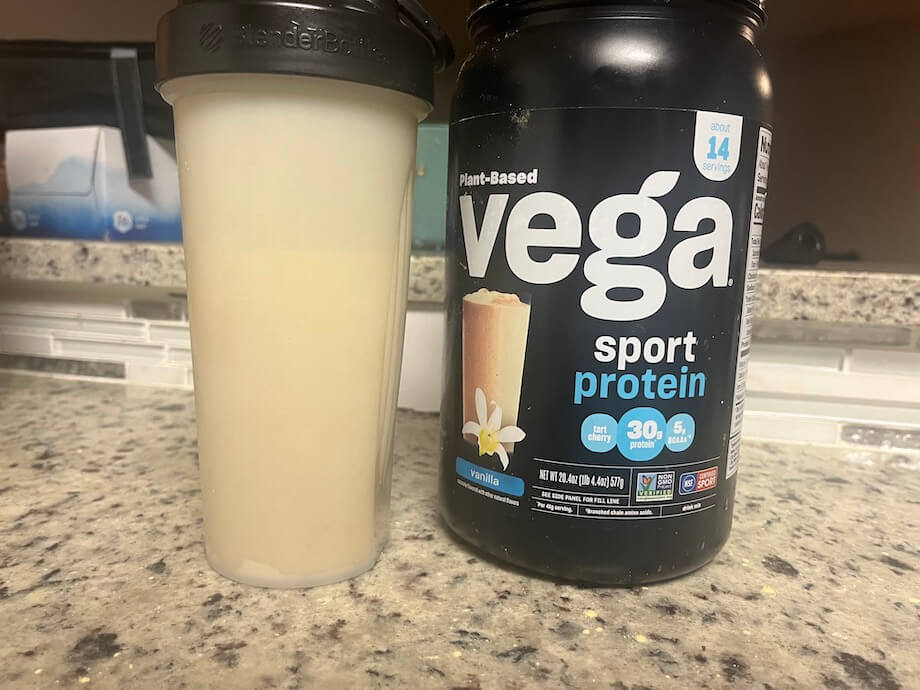
Vega Sport comes in five various flavors—like Berry, Mocha, and Peanut Butter—that are all free of added sugars and artificial ingredients like artificial sweeteners and dyes. Each flavor is sweetened and flavored with more natural ingredients like stevia, cocoa powder, and peanut flour.
Whereas most dairy-based proteins provide calcium and potassium, Vega’s plant blend also supplies adequate amounts of iron. If you are watching sodium content, it’s also important to know that Vega is higher sodium (370 mg or 16% DV) compared to whey-based options—for context, Momentous provides 6% DV and Xwerks Grow provides 3%.
RELATED: Best Iron Supplement
Vega is also gluten-free and third-party tested, specifically showcasing the NSF Certified Sport logo to signify it’s free of banned substances from the World Anti-Doping Agency (WADA). Committed to sustainability, Vega is certified B-Corp™ and partners with veritree to help facilitate positive social and environmental change.
Our Vega protein powder review shares more of our thoughts on this product.
| Main Protein Source(s) | Pea protein, pumpkin seed protein, organic sunflower seed protein, alfalfa protein |
| Protein Per Serving | 30 g per 1-scoop (44 g) serving (Chocolate) |
| Calories | 170-180 |
| Flavor Option(s) | Berry, Chocolate, Mocha, Peanut Butter, Vanilla |
| Cost | $54.99/19 servings = $2.89/serving (Chocolate on Amazon) |
| Sweeteners | Stevia leaf extract |
Best Organic Protein Powder for Muscle Gain: Organifi Complete Protein
Good for: Those wanting a protein powder with certified organic ingredients
Best Organic
Organifi Complete Protein
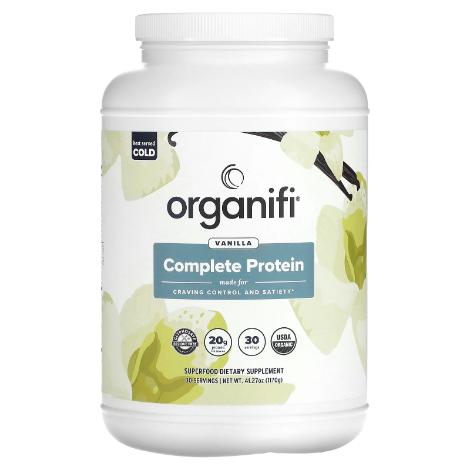
Product Highlights
- 20 g of plant-based protein per serving
- Contains whole food vitamins and minerals
- Certified organic ingredients
- Soy-free, gluten-free, and whey-free
- Available in chocolate and vanilla flavors
Pros & Cons
Pros
- Certified organic
- Minimal ingredients
- Whole food vitamins and minerals
- Money-back guarantee
- Soy-free, gluten-free, and whey-free
Cons
- Only available in two flavors
- Pricier protein
Bottom Line
Made with certified organic ingredients, Organifi Complete Protein is a plant-based protein blend with 20 grams of protein per serving. Available in chocolate and vanilla flavors, this protein is soy-free, gluten-free, and dairy-free, making it great for people avoiding certain allergens—although it does contain tree nuts (coconuts).
Organifi Complete Protein is a certified organic and non-GMO plant-based protein powder. It uses a blend of pea, flaxseed, quinoa, and pumpkin seed proteins. This gives it a complete amino acid profile, meaning it contains all nine essential amino acids. Each serving has 20 grams of protein.
You’ll also get 170 calories, 6 grams of fat, and 8 grams of carbohydrates per serving. This is more than we typically look for in a protein powder, but if you’re trying to pack on more muscle mass, a higher calorie intake (plus following a resistance training program) can help.
To aid digestion, this protein powder includes digestive enzymes. I didn’t notice any digestive troubles after taking it and rated it 5 out of 5 stars for side effects. Organifi also contains a fruit and vegetable blend, though we still recommend eating a variety of fruits and vegetables every day to ensure your body gets an adequate amount of nutrients.
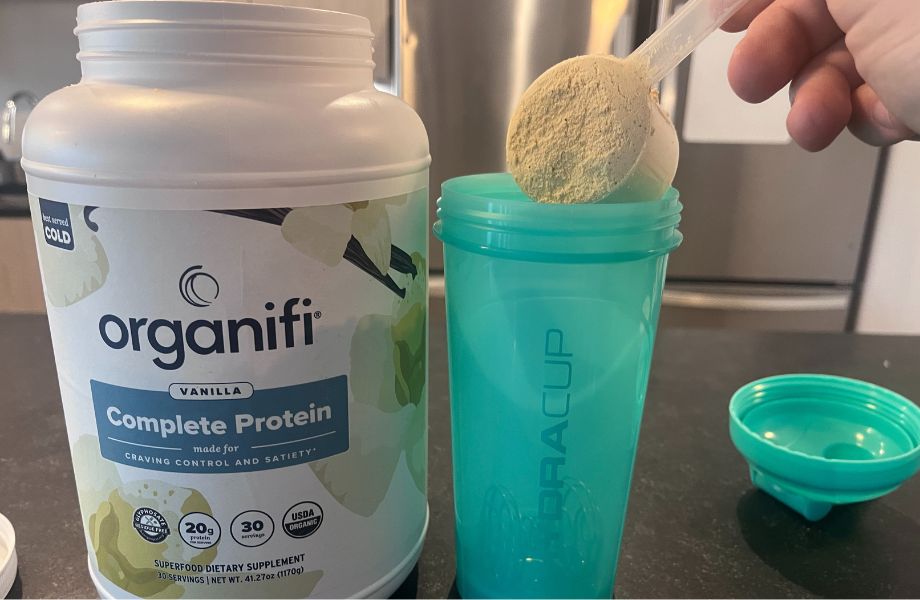
I tested the Vanilla flavor but found the taste underwhelming. I mixed it with oat milk, and the milk overpowered it, so I gave it 3 out of 5 stars for taste. But it does mix very well, and I gave it a 5 out of 5 for solubility.
I’d be remiss if I didn’t call out the high cost per serving. As of this writing, it’s $2.77, making it one of the most expensive protein powders we’ve tested. You can sign up for automatic deliveries once a month to save 10% or buy in bulk to save up to 37.81% on each container, but the cost may still be a dealbreaker for budget-conscious shoppers.
Learn more about this product in our Organifi Complete Protein review.
| Main Protein Source(s) | Pea protein, flaxseed protein, quinoa protein, and pumpkin seed protein |
| Protein Per Serving | 20 g per 1-scoop (39 g) serving (Vanilla) |
| Calories | 160-170 depending on flavor |
| Flavor Option(s) | Vanilla, Chocolate |
| Cost | $79.95/30 servings = $2.77/serving |
| Sweeteners | Organic coconut sugar, organic stevia extract, organic monk fruit extract, agave inulin |
Other Protein Powders for Muscle Gain We Tested and Researched
With hundreds of protein powders on the sports nutrition scene, it’s nearly impossible to confine all of the other great options to a tidy (yet mighty) list. Other protein powders for muscle gain we stand behind include:
- Optimum Nutrition Gold Standard 100% Whey Protein Powder (especially since they have some of the most abundant and best flavors!)
- Muscle Milk Genuine Protein Powder
- NAKED Nutrition Whey Protein Powder
- Performix ioWHEY
- Orgain Organic Grass-Fed Whey
- Cira Bright Whey Protein
- Swolverine Whey Protein Isolate
How We Picked and Tested the Best Protein Powder for Muscle Gain
Now you might be wondering, “So… how did you narrow down hundreds of protein powders to one list?” The short answer: rigorous testing. The longer answer: we picked and tested the best protein powder for muscle gain by reviewing the following:
- Protein content: While it goes without saying, we’ll say it anyway—a solid protein powder should be high in protein. Our top picks range from having 20-31 grams of protein per serving while providing muscle-building essential and branched-chain amino acids.
- Protein source options: Not everyone prefers plant-based proteins, just as not all can tolerate a whey protein powder. That said, we made sure to include various types of protein sources—like whey, pea, and soy proteins—while ensuring they are high-quality protein sources.
- Additional ingredients: If the protein powder contains additional ingredients, we’re always inspecting the logic behind them—like adding digestive enzymes to enhance amino acid digestion and absorption. We also strive to select protein powders without unnecessary ingredients like added fillers and refined sugars.
- Flavor variety: From Honey Cinnamon Peanut Butter to Iced Lemon Cake, we try to capture a flavor favorite to tickle everyone’s fancy—and non-flavored options for those who’d prefer consuming protein without much notice.
- Cost: Because we truly believe everyone should have access to supplements if they can help them reach their fitness and health goals, our top pick lists accommodate various budgets.
Methodology
The Garage Gym Reviews supplement testing methodology has a lot of rules but there’s one that stands above all else—we actually test the products we recommend. That means drinking every protein powder you see on this list to judge things like taste, texture, and side effects (i.e. we let you know which protein powders aren’t the best for a pre-date shake if you get what we’re saying—you’re welcome).
Benefits of Protein Powder for Muscle Gain
Some benefits of protein powder for muscle gain are obvious—yep, it can help spur muscle growth. But others are less obvious, so let’s chat about it.
Promotes Muscle Growth
OK, this one is obvious but it’s still worth mentioning! Protein powder contains the macronutrient protein, which is essential for muscle recovery and growth (and, really, life as we know it). But muscle doesn’t grow independently with or without protein powder, as resistance and strength training is key to facilitating the muscle-building process.
Supports Overall Health
Again, protein really is key for growing and sustaining muscle AND good health. Especially in tandem with resistance training, protein powder can support overall health in various ways, such as:
- Metabolic health: The more lean muscle you carry, generally the higher your metabolism. This helps you maintain, and even cut, weight more effortlessly. But building and sustaining muscle is much more than aesthetics, as a recent 2020 review15 suggests losing skeletal muscle mass may contribute to metabolic disease.
- Bone and joint health: While dependent on the type of protein, protein powders are often rich in micronutrients like calcium. Plus, weight-bearing activities—like resistance training—support bone and joint health.
- Heart health: Research16 suggests whey protein and whey protein isolates assist in reducing blood pressure and cholesterol levels.
- Mental health: Growing muscle with the help of protein powder does much more than the body good. There’s a huge link between exercise and mental health and a recent 2020 meta-analysis17 indicates that muscular strength has a positive effect on reducing depressive symptoms.
Provides “Bulking” Solutions
If you’re trying to lose weight, reducing liquid calories is often a simple solution to (more) effortlessly and naturally cut back on calories. But especially if you’re a hard gainer and struggling to get enough calories and protein down, drinking liquid calories can be the answer to your muscle and weight-gaining prayers.
Of course, you can go for one of the best mass gainers—a blend of protein, carbs, and fat that serves as a higher-calorie meal replacement—but you can also rely on your trusty protein powder to do the trick. Simply bump up the calories of your protein shake by blending it with frozen banana, peanut butter, avocado, and other calorically and nutrient-dense foods.
The emphasis is on nutrient density here: rather than focusing on calories and consuming them from “empty calories” like refined sugars, nutritious and whole-food sources help support your overall health beyond muscle gain.
Offers the Ultimate Convenience
While the anabolic window is not as short as once believed, especially if you’re adequately fueled and a non-competitive athlete, it’s never a bad idea to have protein readily accessible. Instead of packing up chicken that can spoil in your car (insert barf emoji), just mix water and non-perishable protein powder in a shaker and sip!
How Does Protein Help Build Muscle and How Much Do I Need?
The amount of protein you need to gain muscle depends on your age, birth sex, activity level, and other factors. And, fortunately, we have the real answer to “How much protein do I need?”
But as a quick glimpse, and to provide context, we’ll first mention that the recommended daily allowance (RDA) is consuming 0.8 grams of protein per kilogram (g/kg) or 0.35 grams per pound (g/lb) of body weight per day for general health. So for someone who weighs 160 pounds, that’s 56 grams of protein per day.
Simply divide your weight by 2.2 to get your weight in kilograms and multiply that number by 0.8 kilograms to figure out how much protein you need.
To build muscle mass and maintain positive muscle protein balance, the International Society of Sports Nutrition18 recommends an overall daily protein intake in the range of 1.4-2.0 g/kg of protein per day. Based on the same individual who weighs 160 pounds, this would amount to 102-154 grams of protein intake daily.
What is Protein Powder?
Protein powder is a dietary supplement made through an extraction and drying process from protein-sich sources like milk, eggs, and plants. Typically this process separates the protein content from the non-protein elements (like carbohydrates and fats) and leaves you with a protein-dense product. Protein powder is an ideal supplement for meeting your daily protein goals, building muscle, and aiding muscle recovery from exercise.
RELATED: How is Protein Powder Made?
Other Macronutrients for Muscle Gain
Getting enough protein is key for muscle building but the other macronutrients should not be overlooked. Because even if you hit your daily protein targets, you might not be fueling your body enough.
To help paint this picture, let’s say you’re consuming 100 grams of protein per day. Because protein contains 4 calories per gram, this would amount to 400 calories coming from protein (4 calories in 1 gram of protein). Unlike the pure protein in some protein powders, high-protein foods—such as sirloin, fatty fish, and beans—nourish the body with carbs and fats while boosting daily calories.
Needless to say, you must be also providing the body with adequate calories, carbohydrates, and fats to support muscle growth, training, and overall health. How you accomplish this is up to you but whole food sources should dominate eating patterns and dietary supplements be used to, well, supplement the diet as needed.
RELATED: Best Supplements for Muscle Growth
To take the guesswork out of your nutrition needs, we recommend consulting with a dietitian. They can help you create a nutritional game plan to meet your personal goals, as well as assist you in finding a reputable protein powder such as those listed above.
Types Of Protein Powder To Build Muscle
From whey protein to pea protein to everything far and in between, protein powders isolate their protein from various food sources. Whey and egg protein are some of the most popular types along with plant-based options like pea, rice, and soy.
Go with a protein source—and entire protein powder formulation, for that matter—that best suits your dietary needs and preferences, including a plant-based option if you’re lactose-intolerant or aiming to cut back on animal products.
The protein source should likewise match when you intend to consume it. For instance, fast-acting whey proteins will likely provide the most benefit post-workout whereas slow-acting casein might be best to take before bedtime due to sustained amino acid release.
Buying Guide: What to Look for in Protein Powder for Muscle Gain
While all of the protein powders we reviewed are great options to assist in muscle-gaining efforts, finding the best one for you is a bit more nuanced. Before checking out your online cart, make sure it factors in and checks most (if not all) of these boxes.
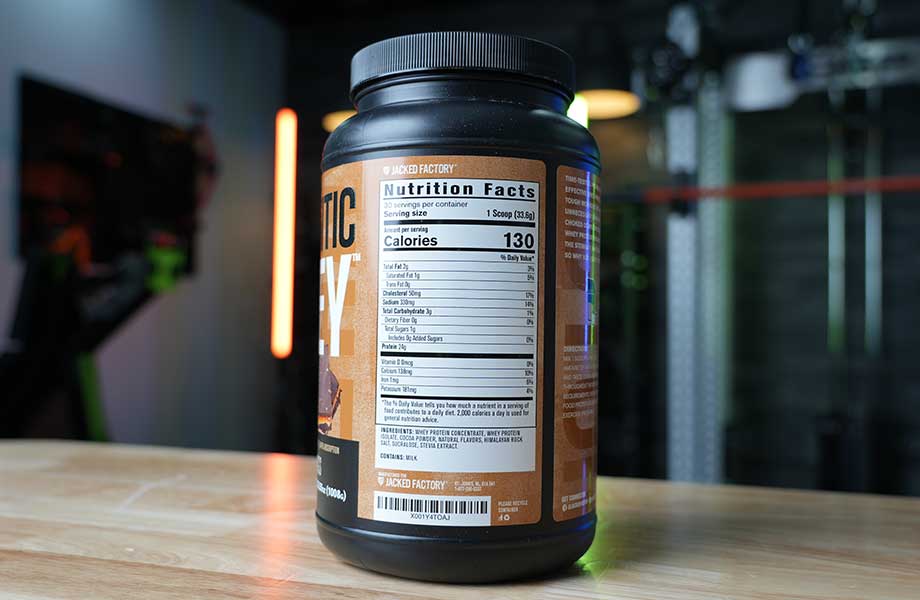
Protein Content
Speaking of protein, try to choose a protein powder that supplies at least 20 grams of protein per serving. Also know that plant-based protein powders tend to be naturally lower in protein compared to whey-based options, although you can always bump up the portion to meet your needs.
If an amino acid profile is available, you can check the specific amounts of muscle-building BCAAs and essential amino acids.
Flavor
While protein powders might not appear as delicious as a juicy filet mignon, that doesn’t mean you can’t enjoy them. And with countless flavor options, you should!

Also, grab a flavor that will suit how you plan to enjoy it—whether that be a fruity option blended in a smoothie, Gourmet Chocolate baked into goodies, or nostalgic Fruity Pebbles to sip on its own. If you’d prefer a sneaky protein boost, an unflavored option might be right for you.
Additional Ingredients
While the protein source and content should be the highlight, some protein powders contain ingredients—like digestive enzymes and probiotics—to enhance the overall benefit of the blend. On the flip side, also pay attention to unwanted ingredients like added fillers and preservatives.
Certifications and Verifications
Since protein powder (and dietary supplements as a whole) are not tightly regulated, we always recommend reviewing the certifications and verifications of the product of interest. At a minimum, double-check to see if the product is third-party tested and manufactured in NSF-certified, FDA-inspected, and/or cGMP-compliant facilities.
You can also decide which certifications are important to you—like being Certified USDA Organic and Certified Gluten-Free. And especially if you’re a competitive athlete, it’s a super smart idea to ensure the product is Informed Sport certified.
Brand Integrity
Because you’re supporting a company with your hard-earned dollars, the integrity and values of a brand are almost always worth looking into. Of course, this is completely personal, and you might just like the product without the company association.
But at GGR, we are always reviewing the company behind the product and looking into these common areas:
- An “About Us,” page, a “Company Mission,” page, and other similar pages that capture their mission and core values. Do they align with your values and beliefs?
- Consumer reviews on the company’s main website, social media profiles, and third-party seller sites as available. These can really tell you A LOT about not just the product, but how the company treats their customers (and sometimes employees).
- Customer service access, money-back guarantees, and return policies (or lack thereof). These can help you feel more confident in your purchase, specifically knowing the company will (or won’t) accommodate any product issues you run into.
Ingredients To Pay Attention To
When buying a protein powder for muscle gain, looking beyond the protein content and the source of protein can help you decide if it’s right for you. Below are some ingredients you’ll want to watch out for to ensure you don’t have any issues with your protein powder.
Artificial Ingredients and Sugar Alcohols
Lower-quality protein powders often contain artificial sweeteners and sugar alcohols. These ingredients are generally considered safe when consumed in small quantities, but may cause digestive issues in some people.
Artificial sweeteners you may find in protein powder include:
- Sucralose
- Acesulfame potassium
- Aspartame
- Saccharin
Sugar alcohols that are common in protein powder include:
- Erythritol
- Xylitol
- Sorbitol
- Maltitol
Thickeners and Emulsifiers
Thickeners and emulsifiers in protein powders help improve the texture and make the powders easy to dissolve. Like artificial sweeteners and sugar alcohols, they are considered safe in small quantities but can cause bloating, gas, or other digestive problems in certain people.
Thickeners and emulsifiers to watch out for include:
- Lecithin (soy or sunflower)
- Xanthan gum
- Guar gum
- Carrageenan
- Locust bean gum
Common Allergens
If you have a food allergy, pay attention to the ingredients list. Some flavored protein powder varieties, like anything with peanut butter, may contain traces of nuts. Those who are allergic to dairy will want to stay clear of whey or casein protein powders. Also, check to see if the protein powder is manufactured in a facility that also handles shellfish, gluten, or other allergens. If so, there’s a chance that the product may be contaminated with something you’re allergic to.
Proprietary Blends
Some supplement companies use proprietary blends in their formulas. The ingredients in these blends may have some benefits on overall health and exercise performance, but it’s difficult to know the quantities of each ingredient. Therefore, you won’t know if you’re consuming clinically-effective doses of those ingredients.
How to Safely Increase Protein Intake
Before getting into our tips for increasing protein intake, we want to highlight that a high-protein diet is safe for healthy individuals. A 2016 study19 suggests that sedentary individuals can safely consume 1 gram of protein per kilogram of body weight per day. That number goes up to 1.3 to 1.6 grams of protein per kilogram of body weight per day for active people.
However, a 2023 study20 recommends that certain populations, like people with kidney issues, limit their protein intake. We also recommend that anyone considering a significant dietary change consult with a physician or registered dietitian first.
Once you’re ready to add more protein to your diet, follow these tips:
- Start your day with a protein-rich breakfast.
- Add a protein source to all of your meals and snacks.
- Swap your regular yogurt with Greek yogurt or another high-protein yogurt.
- Opt for leaner cuts of meat (for example, 90% or leaner ground beef).
- Choose a protein pasta instead of pasta made with white flour.
- Use a calorie-counting app to monitor your intake.
For more guidance, check out our guide on how to get more protein.
FAQs About Protein Powder for Muscle Gain
What type of protein builds muscle the fastest?
Protein powder on its own won’t help you gain muscle faster. You’ll need to do some resistance training and eat in a calorie surplus (i.e., eat more calories than you burn) to build muscle. A protein powder supplement can help you add more calories to your diet and achieve that caloric surplus.
Should I use protein powder to gain muscle?
Protein powder is a supplement can also help if you fill the gap and reach your daily protein goals. However, getting protein from a variety of sources is essential when trying to gain muscle. It can help ensure your body gets a wide variety of nutrients and prevent you from getting bored with your meals. Chicken, lean cuts of beef, Greek yogurt, egg whites, and certain types of fish (like shrimp or cod) are excellent sources of protein.
How to build muscle fast?
To build muscle fast, you need to lift heavy weights (60% to 75% of your one-rep max) regularly and eat enough calories. An extra 500 calories per day is a good starting point. Following effective rep and set ranges when training is also important. We recommend performing 3 to 6 sets of 6 to 12 reps per exercise.
What are the disadvantages of protein powder?
A common disadvantage to supplementing with protein powder is digestive issues and protein farts. You may have to experiment with different formulas and protein types to find one that doesn’t upset your stomach.
Another disadvantage is potential contamination from large-scale farming like the use of chemicals and fertilizers or traces of heavy metals.
These statements have not been evaluated by the Food and Drug Administration. This product is not intended to diagnose, treat, cure, or prevent any diseases.
References
- Kadam B, Ambadkar R, Rathod K, et al. Health Benefits of Whey: A Brief Review. Int J Livest Res. 2018;8(5):31. doi:https://doi.org/10.5455/ijlr.20170411022323
- Arroyo-Cerezo A, Cerrillo I, Ortega Á, et al. Intake of branched chain amino acids favors post-exercise muscle recovery and may improve muscle function: optimal dosage regimens and consumption conditions. J Sports Med Phys Fitness. 2021 Nov;61(11):1478-1489. doi: 10.23736/S0022-4707.21.11843-2. Epub 2021 Feb 15. PMID: 33586928.
- Duarte NM, Cruz AL, Silva DC, et al. Intake of whey isolate supplement and muscle mass gains in young healthy adults when combined with resistance training: a blinded randomized clinical trial (pilot study). J Sports Med Phys Fitness. 2020 Jan;60(1):75-84. doi: 10.23736/S0022-4707.19.09741-X. Epub 2019 Sep 23. PMID: 31565912.
- Bell RAV, Al-Khalaf M, Megeney LA. The beneficial role of proteolysis in skeletal muscle growth and stress adaptation. Skelet Muscle. 2016;6(1). doi:https://doi.org/10.1186/s13395-016-0086-6
- Miller PC, Bailey SP, Barnes ME, et al. The effects of protease supplementation on skeletal muscle function and DOMS following downhill running. J Sports Sci. 2004 Apr;22(4):365-72. doi: 10.1080/02640410310001641584. PMID: 15161110.
- França E de, Avelar B, Yoshioka C, et al. Creatine HCl and Creatine Monohydrate Improve Strength but Only Creatine HCl Induced Changes on Body Composition in Recreational Weightlifters. Food Sci Nutr. 2015;06:1624. doi:https://doi.org/10.4236/fns.2015.617167
- Townsend JR, Morimune JE, Jones MD, et al. The Effect of ProHydrolase® on the Amino Acid and Intramuscular Anabolic Signaling Response to Resistance Exercise in Trained Males. Sports (Basel). 2020;8(2):13. Published 2020 Jan 22. doi:10.3390/sports8020013
- France TC, Kelly AL, Crowley SV, et al. Cold Microfiltration as an Enabler of Sustainable Dairy Protein Ingredient Innovation. Foods. 2021;10(9):2091. Published 2021 Sep 4. doi:10.3390/foods10092091
- Yoon M. S. (2017). mTOR as a Key Regulator in Maintaining Skeletal Muscle Mass. Frontiers in physiology, 8, 788. https://doi.org/10.3389/fphys.2017.00788
- Kalman DS. Amino Acid Composition of an Organic Brown Rice Protein Concentrate and Isolate Compared to Soy and Whey Concentrates and Isolates. Foods. 2014;3(3):394-402. Published 2014 Jun 30. doi:10.3390/foods3030394
- Hirsch KR, Smith-Ryan AE, Roelofs EJ, et al. Cordyceps militaris Improves Tolerance to High-Intensity Exercise After Acute and Chronic Supplementation. J Diet Suppl. 2017;14(1):42-53. doi:10.1080/19390211.2016.1203386
- Langley PC, Pergolizzi JV Jr, Taylor R Jr, Ridgway C. Antioxidant and associated capacities of Camu camu (Myrciaria dubia): a systematic review. J Altern Complement Med. 2015;21(1):8-14. doi:10.1089/acm.2014.0130
- Sadowska-Krępa E, Kłapcińska B, Podgórski T, et al. Effects of supplementation with acai (Euterpe oleracea Mart.) berry-based juice blend on the blood antioxidant defence capacity and lipid profile in junior hurdlers. A pilot study. Biol Sport. 2015;32(2):161-168. doi:10.5604/20831862.1144419
- Tipton KD, Elliott TA, Cree MG, et al. Ingestion of casein and whey proteins result in muscle anabolism after resistance exercise. Med Sci Sports Exerc. 2004 Dec;36(12):2073-81. doi: 10.1249/01.mss.0000147582.99810.c5. PMID: 15570142.
- Kim G, Kim JH. Impact of Skeletal Muscle Mass on Metabolic Health. Endocrinol Metab (Seoul). 2020;35(1):1-6. doi:10.3803/EnM.2020.35.1.1
- Kadam B, Ambadkar R, Rathod K, Landge S. Health Benefits of Whey: A Brief Review. Int J Livest Res. 2018;8(5):31. doi:https://doi.org/10.5455/ijlr.20170411022323
- Marques A, Gomez-Baya D, Peralta M, et al. The Effect of Muscular Strength on Depression Symptoms in Adults: A Systematic Review and Meta-Analysis. Int J Environ Res Public Health. 2020;17(16):5674. Published 2020 Aug 6. doi:10.3390/ijerph17165674
- Jäger R, Kerksick CM, Campbell BI, et al. International Society of Sports Nutrition Position Stand: protein and exercise. J Int Soc Sports Nutr. 2017;14(1). doi:https://doi.org/10.1186/s12970-017-0177-8
- Wu G. (2016). Dietary protein intake and human health. Food & function, 7(3), 1251–1265. https://doi.org/10.1039/c5fo01530h
- Ko, G. J., Rhee, C. M., Kalantar-Zadeh, K., & Joshi, S. (2020). The Effects of High-Protein Diets on Kidney Health and Longevity. Journal of the American Society of Nephrology : JASN, 31(8), 1667–1679. https://doi.org/10.1681/ASN.2020010028
Further reading
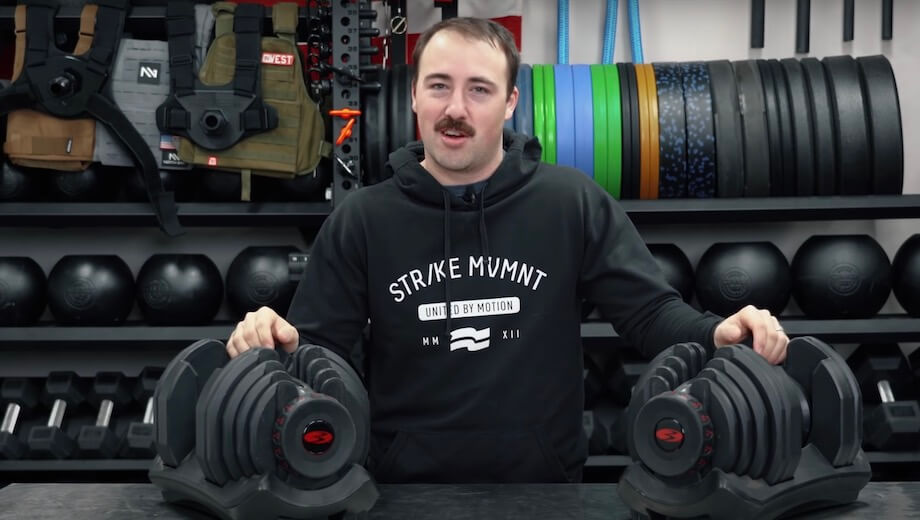
Our Bowflex 1090 review gives you the good, bad, and ugly of these adjustable dumbbells. Read more

Our cross trainer vs treadmill guide explores the benefits, similarities, and differences between these two cardio machines so you can maximize your training. Read more
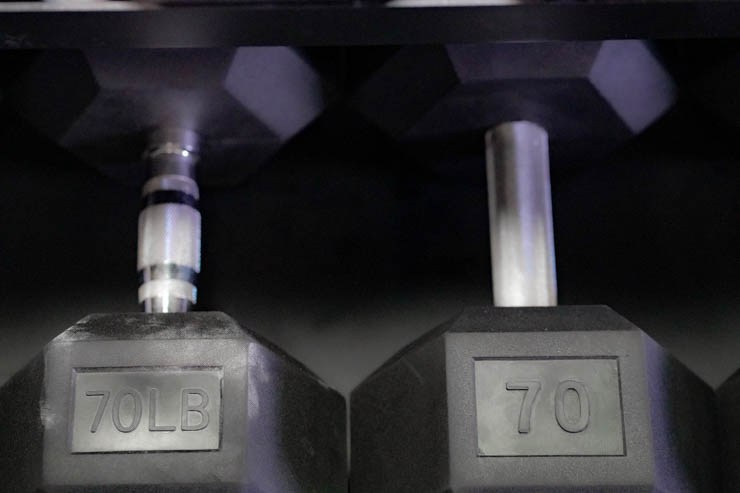
It’s a battle of the brands in this Rogue dumbbells vs REP dumbbells comparison. Which will land on top? Read more
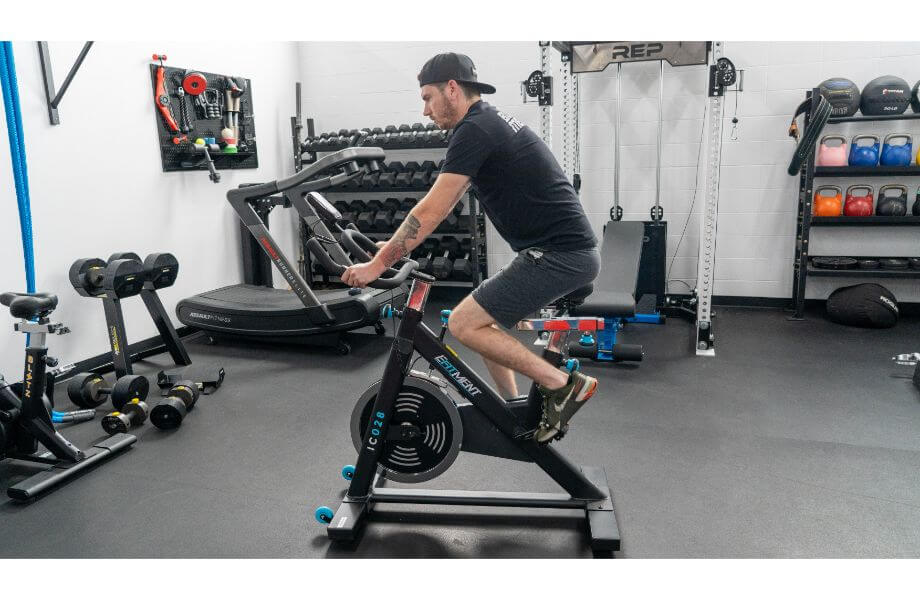
Does cardio lower blood pressure? The evidence says yes, but cardio should also be used alongside other healthy lifestyle habits. Read more

